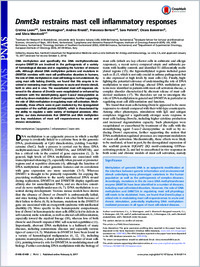Dnmt3a restrains mast cell inflammatory responses
- Leoni, Cristina Institute for Research in Biomedicine (IRB), Faculty of Biomedical Sciences, Università della Svizzera italiana, Switzerland - Graduate School for Cellular and Biomedical Sciences, University of Bern, 3012 Bern, Switzerland
- Montagner, Sara Institute for Research in Biomedicine (IRB), Faculty of Biomedical Sciences, Università della Svizzera italiana, Switzerland
- Rinaldi, Andrea Institute of Oncology Research (IOR), Faculty of Biomedical Sciences, Università della Svizzera italiana, Switzerland
- Bertoni, Francesco Institute of Oncology Research (IOR), Faculty of Biomedical Sciences, Università della Svizzera italiana, Switzerland - Oncology Institute of Southern Switzerland (IOSI), 6500 Bellinzona, Switzerland
- Polletti, Sara Department of Experimental Oncology, European Institute of Oncology (IEO), 20139 Milan, Italy
- Balestrieri, Chiara Department of Experimental Oncology, European Institute of Oncology (IEO), 20139 Milan, Italy
- Monticelli, Silvia Institute for Research in Biomedicine (IRB), Faculty of Biomedical Sciences, Università della Svizzera italiana, Switzerland
-
06.02.2017
Published in:
- Proceedings of the national academy of sciences. - 2017, vol. 114, no. 8, p. E1490-E1499
English
DNA methylation and specifically the DNA methyltransferase enzyme DNMT3A are involved in the pathogenesis of a variety of hematological diseases and in regulating the function of immune cells. Although altered DNA methylation patterns and mutations in DNMT3A correlate with mast cell proliferative disorders in humans, the role of DNA methylation in mast cell biology is not understood. By using mast cells lacking Dnmt3a, we found that this enzyme is involved in restraining mast cell responses to acute and chronic stimuli, both in vitro and in vivo. The exacerbated mast cell responses observed in the absence of Dnmt3a were recapitulated or enhanced by treatment with the demethylating agent 5-aza-2′-deoxycytidine as well as by down-modulation of Dnmt1 expression, further supporting the role of DNA methylation in regulating mast cell activation. Mechanistically, these effects were in part mediated by the dysregulated expression of the scaffold protein IQGAP2, which is characterized by the ability to regulate a wide variety of biological processes. Altogether, our data demonstrate that DNMT3A and DNA methylation are key modulators of mast cell responsiveness to acute and chronic stimulation.
- Language
-
- English
- Classification
- Medicine
- License
-
License undefined
- Open access status
- green
- Identifiers
-
- RERO DOC 324254
- DOI 10.1073/pnas.1616420114
- ARK ark:/12658/srd1318903
- Persistent URL
- https://n2t.net/ark:/12658/srd1318903
Statistics
Document views: 205
File downloads:
- Texte intégral: 253
